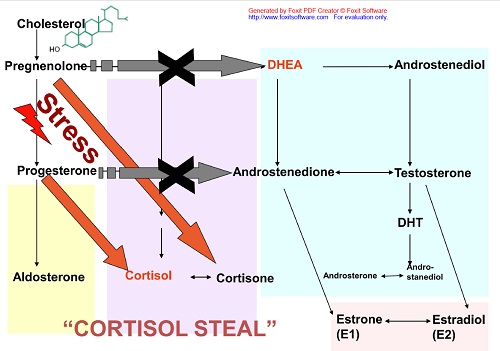
The autonomic nervous system, HPA axis, cardiovascular, metabolic and immune systems protect the body by responding to internal and external stress…”
Protective and Damaging Effects of Stress Mediators, J. Flier and L. Underhill
Notice how many of our body systems are responding to stress…nervous system, HPA axis, cardiovascular system, metabolic and the immune system!!! Stress is not just a “feeling” or something that occurs in our brain, it is so much more than that and affects our entire body! It’s all connected…
Ever notice that when you’re under a lot of stress you tend to get sick? What happens to your blood pressure when you are stressed? How about blood sugar?
When the stress response is triggered cortisol is released (from the cortex of the adrenal glands located just above the kidneys) until the perceived stress has passed. Unfortunately, sometimes the perceived stress doesn’t stop and our body is pumping out cortisol all day (month, year…) long resulting in over exposure of stress hormones.

Stressors can show up in four main ways that are harmful. Frequent stress, repeated exposure to the same stress without adapting, inability to shut off the stress response resulting in exhaustion, and if the system becomes exhausted and isn’t releasing enough cortisol the body can’t properly counterbalance it’s reaction to stress (and ends up increasing inflammation). (Source)
Cortisol mediates various metabolic processes (such as gluconeogenesis), has anti-inflammatory and immunosuppressive properties, and whose levels in the blood may become elevated in response to physical or psychological stress.”
Merriam Webster Dictionary
It is interesting to consider that cortisol by definition is anti-inflammatory! As with everything balance is key! Having an appropriate stress response is necessary as a means of survival. If you’re being chased by a bear you want your fight or flight response to work but you don’t want each email, phone call, or thought you have during the day to trigger the same response.
There are so many detrimental effects from chronic stress. We often talk about lack of dietary calcium and Vitamin D associated with osteoporosis, but neglect to consider other factors such as chronically elevated cortisol inhibiting bone formation.
Cholesterol is the precursor to all of our sex hormones and cortisol. Under chronic stress our bodies can experience “cortisol steal” where the over abundant production of cortisol causes inadequate production of sex hormones resulting in hormonal imbalance (i.e. you’re making cortisol instead of progesterone, testosterone, and estrogen).

So how do you avoid being overwhelmed by cortisol?

- Turn off unnecessary notifications on your computer, email, phone, etc.
- Minimize “noise” in your life.
- Create a daily routine.
- Change your mindset from being “busy” to being “productive.” Shifting your thoughts and reframing them can change perception of stress.
- Take time to unplug, reflect on your day and truly rest before bed. It’s important to digest not only our food but also our emotions, experiences, etc.
- Meditate, journal, pray, etc.
- Spend time in nature.
- Get high quality sleep. Avoid prescription sleep medications. Get to the root cause of any sleep disturbances.
- Cut out the caffeine. Caffeine increases cortisol production.
- Express and experience gratitude and love.
- Balance your blood sugar. Cortisol raises blood sugar and insulin lowers it. Chronically elevated cortisol can result in insulin resistance (article).
- Let go of anger, resentment and negative thoughts that keep replaying in your mind (rumination).
- Smile and laugh. Laughter is no joke when it comes to stress reduction (article).
- Consider adaptogens such as rhodiola, tulsi, or ashwagandha. Avoid benzodiazepines (article, article).
- Spend time with others who bring you joy.
Don’t let this list cause you stress! Find one or two things on the list that speak to you and start there. Progress not perfection…



Leave A Comment